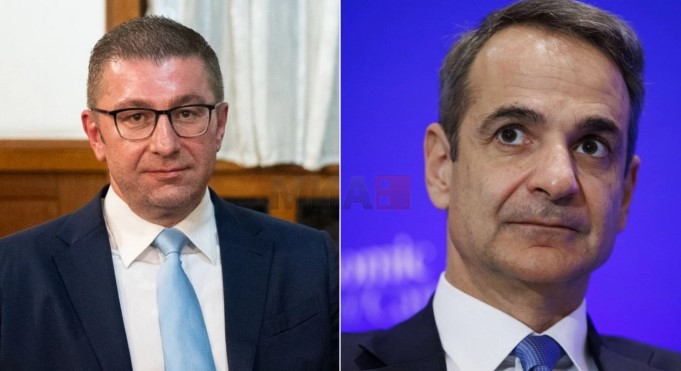“We are a small and peaceful nation ready to build good neighborly relations with everyone,” Macedonian Prime Minister Hristijan Mickoski told Bulgarian President Rumen Radev and Greek Prime Minister Kyriakos Mitsotakis. He emphasized that “we see cooperation as a two-way street, not a one-way street” and advised them to get used to the new policy which protects the interests of Macedonian citizens.
This statement was a reaction to Radev’s comments to the media after his meeting with Mitsotakis in Athens, where he said that “the leadership of the Republic of North Macedonia is not ready” and “the authorities in Skopje lack knowledge of constitutional law.”
“Gone are the times when our country, the Macedonian Government, had politicians with bent spines, politicians who humiliate themselves, who are ready to sign anything but not protect the interest of the Macedonian citizens. These politicians would wave the Macedonian flag while robbing the state and its citizens.
They must get used to politicians who are here to protect the interests of the citizens, to work for the good of the homeland and the future. We are ready to build good neighborly relations with everyone. My message to both of them, however, is that they are more experienced than me—they have been in their positions longer, one as president of a country, the other as prime minister. We are a peaceful, small nation, one of the smallest in the Balkans, and we are ready to cooperate with anyone, seeing cooperation as a two-way street.
It cannot be one-way, and as of May 8, the times when cooperation with Macedonian politicians was seen as a one-way street are over,” Mickoski said in response to journalists’ questions.
As reported by MIA, Mickoski called on Radev and Mitsotakis to cooperate for the economic development of the states and the bringing together of peoples. Regarding the comment about misunderstanding politics, he believes that good neighborly policy is not built “with disparagement and insults.”
“I’m used to humiliation and insults—my whole life has been like that—but somehow I always win in the end. We will see how it will be in this case.
I want us, as Balkan states, to follow the examples of other types of states, such as the Baltic and Scandinavian countries, and together build bridges, perform jointly in third markets, and present a united front before the officials in the European Union and globally.
Let’s build a good neighborly policy. With disparagement and insults, that is not the case.
If they have decided to act in this manner, I thought that we left such behavior in the Middle Ages. I thought that now, in the 21st century, we should talk about how to jointly develop our common economy, education, tourism, network people, and get closer.
I am ready to talk about it and I think that my interlocutors should reconsider their statements and behavior. However, who am I to tell them what to do?” Mickoski said during his visit to Gevgelija.





Comments are closed for this post.